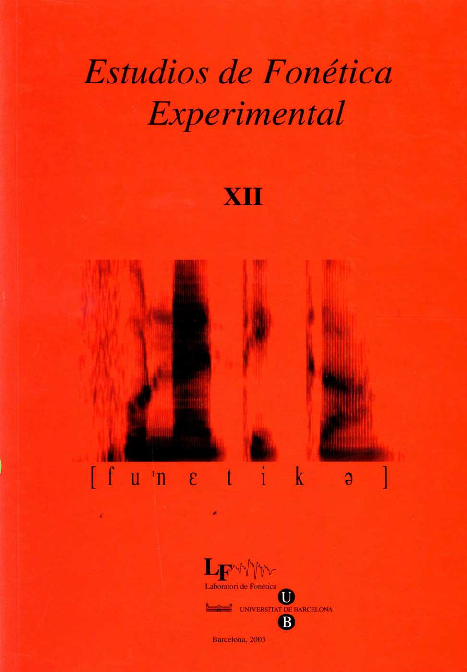FRANCISCO JOSÉ CANTERO (2002): Teoría y análisis de la entonación, Barcelona, Edicions de la Universitat de Barcelona.
Abstract
To be added.
References
CORTÉS MORENO, M. (1999): Adquisición de la entonación española por parte de hablantes nativos de chino, tesis doctoral inédita, Universidad de Barcelona.
D’INTRONO, F; E. DEL TESO y R. WESTON (1995): Fonética y fonología actual del español, Madrid, Cátedra.
DUBOIS, J. y OTROS (1973): Diccionario de lingüística, Madrid, Alianza, 1979.
MARTÍNEZ CELDRÁN E; A. Mª FERNÁNDEZ PLANAS y N. FULLANA RIVERA (2003): «Pre-nuclear tonal inventories of Spanish intonation», Proceedings of the 15th International Congress of Phonetic Sciences, Barcelona (en prensa).
NAVARRO TOMÁS, T. (1944): Manual de entonación española, Madrid, Guadarrama, edición de 1974.
PRIETO, P; J. VAN SANTEN y J. HIRSCHBERG (1995): «Tonal alignment patterns in Spanish», Journal of Phonetics, vol. 23, 4, pp. 429-451.
SOSA, J. M. (1995): «Nuclear and pre-nuclear tonal inventories and the phonology of Spanish declarative intonation», en K. Elenius and P. Branderud (eds), Proceedings of the ICPhS 95, Arne Stombergs, Estocolmo, vol. 4, pp. 646-649.
TYLOR, J. R. (1991): Linguistic Categorization. Prototypes in Linguistic Theory, Oxford, Clarendon Press.
Downloads
Published
How to Cite
Issue
Section
License

This work is licensed under a Creative Commons Attribution-NonCommercial-NoDerivatives 4.0 International License.
All articles published online by Estudios de Fonética Experimental are licensed under Creative Commons Attribution-NonCommercial-NoDerivs 4.0 International (CC BY-NC-ND 4.0 DEED), unless otherwise noted. Estudios de Fonética Experimental is an open access journal. Estudios de Fonética Experimental is hosted by RCUB (Revistes Científiques de la Universitat de Barcelona), powered by Open Journal Systems (OJS) software. The copyright is not transferred to the journal: authors hold the copyright and publishing rights without restrictions. The author is free to use and distribute pre and post-prints versions of his/her article. However, preprint versions are regarded as a work-in-progress version used as internal communication with the authors, and we prefer to share postprint versions.




